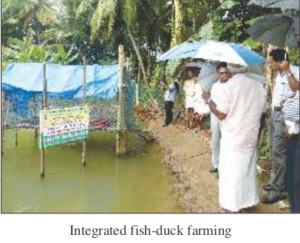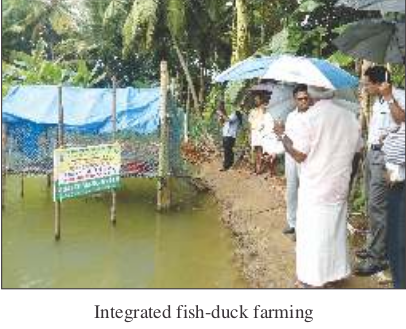Role of Veterinarians in Integrated Farming System
Alok Singh1, Jigyasa Rana2, Adesh Kumar3, Rohini Gupta4, Shailesh Kumar Patel5
1Department of Veterinary Pathology, College of Veterinary Science and A.H., Anjora, Durg, C.G. 491001
2Department of Veterinary Anatomy, Faculty of Veterinary and Animal Sciences, RGSC, BHU, Barkachha, Mirzapur, U.P. 231001
3Veterinary Assistant Surgeon, Deputy Director Office, Department of Animal Husbandry and Dairying, Sehore, M.P. 466001
4Department of Veterinary Medicine, College of Veterinary Science and A.H., Jabalpur, C.G. 491001
5Department of Veterinary Pathology, College of Veterinary Science and A.H., Rewa, M.P. 486001
Agriculture is the primary source of livelihood for about 58% of India’s population. The gross value added by agriculture, forestry, and fishing was estimated to be Rs. 19.48 lakh crore (US$ 276.37 billion) in financial year 2020. Livestock plays an important role in the total GDP of the country and veterinarians contribute a lot in improving the living standards and sustainability of the farmers in India. The farming system in India is basically practiced in integrated forms, wherein benefits are being reaped from both livestock and agriculture. The benefit obtained from one sector is being utilized for the uplifment of the other sector and vice-versa. This type of farming system is known as integrated farming. Mostly backyards farmers/ small stockholders do this type of farming at their own with limited resources and marginal profits. Here comes the role of veterinarians, who by their knowledge can improve the livestock health and thereby benefits the farmers to a greater extent. A Veterinary graduate has comprehensive knowledge on animal health, nutrition, reproduction, selection etc. therefore, he/she can guide the farmer in a better way and can improve their living standards. A veterinarian can also guide and educate the farmers on disease management, biosecurity measures, hygiene practices, selection of breed, healthy production of meat/milk etc. Veterinarians can also update the farmers on ongoing Government policies regarding the livestock development, compensation programmes, thereby help them to get benefited from the concerned departments.
Integrated farming system is very lucrative to farmers but requires more management, manpower, competence and deliberate intensions in comparison to simple farming. Along with this, a good scientific knowledge on either of the components of the farming is utmost necessary. The sustainability of integrated farming basically depends upon the agro-climatic conditions of the area. Additionally, livestock compatibility to the area largely depends upon the choice of breed, farming culture, purpose of the farming etc. Crop and livestock selection needs experience to make the farming fruitful and viable. Choosing a breed which doesn’t fit to the agro-climatic conditions and fodder vice-versa will make the farmer loose his money, time, labor and interest to revive it back. Therefore, veterinarian can calculate the total cost incurred and expected profit from the integrated farming system. They can make out the probable reasons for any kind of failure and in turn scientifically support the farmers in minimizing the losses with maximum profit. As we all know that the Government of India is trying hard to double the farmer’s income wherein, the role of veterinarians becomes inevitable.

Fig: Integrated duck – fish farming system
A veterinarian can create an awareness among the farmers on disease that are endemic and also those that needs to be addressed. The disease free farming system will reap more benefit and help the farmers and stakeholders to increase their boundaries and think about other inclusive areas. As disease experts, they can guide the farmers to practice good managemental and hygienic practices and also follow some prophylactic measures to keep the diseases at bay. A veterinarian can also train the farmers on basic hygienic practices and advice them whenever necessary. They can extend their support to the farmers by arranging trainings on production uplifment, bio-security measures to be adopted before and during disease outbreak, educate them on timely reporting of disease to the concerned authority. In context to this, a veterinarian can also provide the farmers a platform to speak about their challenges and support they want to improve their farming system.
Poultry farming is a very common practice in India. Around 75% of the villagers rear poultry at their own. The poultry farming has gain popularity in livestock business globally because of its high prolificity and profitability. Although, at times poultry business suffer great lost due to occurrence of some disease, inadequate nutrition, poor managemental practices, improper vaccination schedule, less/no bio-security measures, relaxations at transboundary check-points, less/no disease surveillance and reporting system etc. In context to this, a veterinarian, having scientific knowledge, can address these points and help the farmers in timely implementation of some crucial measures to reduce the loss and rejuvenating the sector. Proper disease control programmes including-schedule vaccination, disinfection, hygienic practices, good managemental practices, awareness on the current situation will help the farmers to rear the poultry in scientific manner and reap good benefits Additionally, a veterinarian can advice and organize trainings to adopt a new combination of farming depending upon the geographical location, land area covered, and willingness of the farmer. To say, if poultry farming is integrated with fish farming then the chicken can be raised over or adjacent to the ponds and the poultry excreta recycled to fertilize the fish ponds. Raising chickens over the pond has certain advantages: it maximizes the use of space; saves labour in transporting manure to the ponds and the poultry house is more hygienic.
Veterinarians intervene in different ways in getting farmers household improved through technology injection and innovation in their livestock rearing by providing them technical, financial and moral support.
In conclusion, the aim of doubling the farmer’s income cannot be achieved without integration of agriculture with livestock. The government and all state agricultural universities along with Indian Council of Agricultural Research has been developed many models for integrated farming system but till date the integrated farming is not gained desirable popularity due to lack of scientific support, extension and training. In this context, inclusion of veterinarians in a planned way with an exhaustive framework is need of the hour to increase the sustainability of the integrated farming system in India.
https://agritech.tnau.ac.in/agriculture/agri_majorareas_smmf03.html


